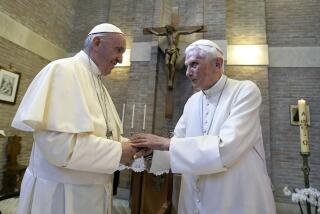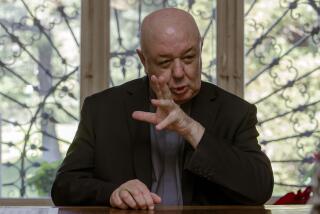THE IRAN--CONTRA HEARINGS : Excerpts: ‘Hold Body, Soul Together’
- Share via
\o7 WASHINGTON\f7 — Following are excerpts from testimony Monday by Robert C. McFarlane, President Reagan’s former national security adviser, to the congressional committees investigating the Iran-contra affair:
Making Foreign Policy
“In the six months since the Iran- contra controversy erupted, many people have come to believe there is something wrong with the way this country makes foreign policy. They probably don’t know how wrong. True, the nation’s foreign policy apparatus does produce its share of success. Failures, like those in the Iran-contra affair, do not happen every day. But on any policy issue where party or ideological interests diverge substantially, the system is becoming increasingly subject to incoherence or paralysis. There’s enough blame to go around in all of these matters now under investigation. I have been and remain willing to shoulder my part of it.”
Reagan’s Role
. . . The President repeatedly made clear in public and in private that he did not intend to break faith with the contras. He directed that we make continued efforts to bring the movement into the good graces of Congress and the American people, and that we assure the contras of continuing Administration support, to help them hold body and soul together until the time when Congress would again agree to support them.
Congressional restrictions made it impractical for either the Defense Department or the Central Intelligence Agency to function even as liaison with the contras. The State Department has always been disinclined to be associated with a covert action, but the President had made clear that he wanted a job done. The net result was that the job fell to the National Security Council staff.
Secret Funds
(Arthur L. Liman, counsel for the Senate committee, asked McFarlane whether he informed Reagan about an offer from Saudi Arabia (called only “Country 2”) to provide secret financial assistance to the contras in 1984.)
A: I expect it was within a day, no more than a couple of days. . . . And in that meeting with the President, I provided to him in writing a note card which made clear that Country 2 had chosen to volunteer $1 million per month through the end of the year for contra subsistence. And after that meeting was over, I was called to come back and pick up the note card, which, as I recall it, expressed the President’s satisfaction and pleasure that this had occurred.
Q: Did you communicate to anyone else at that time, besides Adm. (John M.) Poindexter (then McFarlane’s deputy) and the President, that Country 2 had made this contribution?
A: I believe within a day or so I also communicated it to the vice president personally.
Doubts About the Iranians
(McFarlane told Liman about misgivings of Israeli cabinet minister Yitzhak Rabin with the arms sales.)
A: Mr. Rabin had some concerns about the reliability of the Iranians with whom we were dealing, or with whom he was dealing. And I concurred in that. By this time, we were getting intelligence from various sources on the way in which the Iranian intermediaries were conducting themselves with Tehran, and there was very graphic evidence that these were not your normal Jeffersonian kind of persons.
Q: You knew one of them was (Manucher) Ghorbanifar?
A: That’s correct.
Q: And he was a merchant?
A: That’s charitably put.
Q: And you had some questions as to what his motives were?
A: Yes.
Q: And his reliability?
A: Yes.
Q: And had you discussed this at all with the President?
A: Not at any length--a passing reference here or there. I did have a quite lengthy conversation after we returned from the summit (in Geneva in November, 1985).
A ‘Surprising’ Memo
(Liman asked McFarlane about a December, 1985, memo in which Lt. Col. Oliver L. North, who worked on McFarlane’s White House staff, proposed continuing the arms sale s to Iran. McFarlane said he did not see the memo at the time. )
Q: You were in a position in which the secretary of state was opposed . . . and the secretary of defense was opposed (to continued arms sales)?
A: Yes.
Q: And I--and you now were very much opposed to it?
A: Yes.
Q: (White House Chief of Staff) Don Regan opposed to it?
A: Yes.
Q: And here, all of a sudden, a man who was your subordinate up to, I guess, the day he wrote this memorandum, is recommending a course of pursuing this venture?
A: As I say, I didn’t see that, and it’s surprising.
Discovering the Diversion
(McFarlane recounted a conversation with North at the time of an investigation by Atty. Gen. Edwin Meese III last November.)
A: On Sunday morning, he called me at home . . . asked if I could meet with him. . . . He would like to bring his attorney with him, so as to make sure of an accurate record of events that he had to have in mind. So I went to my office at noon that day, downtown, and waited for Col. North, put on some coffee, and about 12:30, I imagine, Ollie arrived alone and came into the office, and we began to talk. . . . He thought that the President was in a very solid position, and that there really was only one matter that concerned him, and it was the matter of the channeling of funds to the contras for the Iran account.
And I said: “Well that was approved, wasn’t it?”
And he said: “Yes, you know it was. You know I wouldn’t do anything without approval.”
And I said: “Well, all you have to do is lay it out, do the right thing.”
And he said, I believe, something to the effect that, “It is a matter of record,” in a memorandum that he had done for Adm. Poindexter.
(After questioning McFarlane about North’s plans to shred documents, Liman asked how North accounted for Meese’s discovering the diversion of money to the contras. )
Q: Did you ask Col. North how they discovered this?
A: I believe that he said that--I asked what happened, I think. And he said: “They must have found the memo,” or words to that effect.
Q: Did he say: “I missed one?”
A: Something like that.
More to Read
Sign up for Essential California
The most important California stories and recommendations in your inbox every morning.
You may occasionally receive promotional content from the Los Angeles Times.










